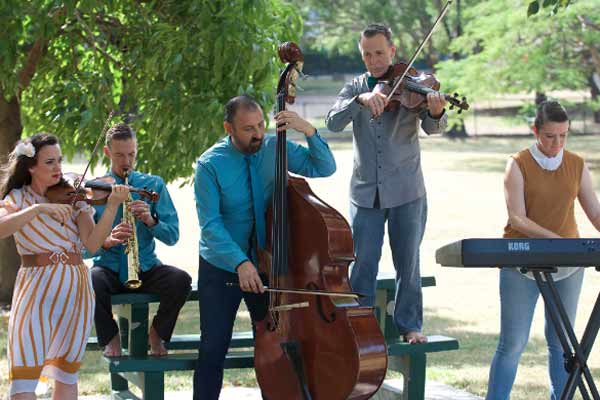Music group Topology have re-visited their house concert beginnings with the release of 'Tortured Remixes' a new full length 'mixtape' album celebrating 20 years of their group, which they'll show off at Horizon Festival.
Made up of five talented musicians across different instruments, Topology's new work is just what is says it is. They remix and rework contemporary classics and even new works in their own ways.
Here, members Robert Davidson, Bernard Hoey and John Babbage answer questions about their work and what they'll be bringing to the Sunshine Coast.
Who are Topology?
R: Topology are John Babbage (composer, saxophone), Robert Davidson (composer, bass), Bernard Hoey (composer, viola), Christa Powell (violin) and Therese Milanovic (piano). We’ve been composing and performing original music together since 1997.
John, you're a founding member of Topology. What has the intention and the vision of Topology been from the very beginning?
We formed Topology mainly because we were all friends that wanted to play music that wasn’t really being heard live around Brisbane. I guess one of our underlying visions was to compose and play music that made people think, challenge their expectations, but at the same time making it accessible to all.
Robert, you've worked with the Australian Opera and Queensland Symphony Orchestra among other things. How does being a part of Topology compare to some of your other career highlights?
Playing with Topology has certainly been my favourite musical experience. We got together because we worked well together and liked each other. After twenty years of doing a vast range of music and traveling all over the place, there is a level of trust and understanding that allows music making not available any other way.]
Bernard, you play the viola and you've been a violist for many years. What do you love about this instrument?
Playing viola is great for making piles of money (or not). I like the expressive capabilities of the viola and its resonant sound. But that applies really to all string instruments, so I have to be honest and say I don't love the viola more than other string instruments, or in fact other non-string instruments. I think it's true to say I love the music more than the instrument.
'Tortured Remixes' is an album filled with popular melodies and songs but remixed in a Topology kind of way. What was the inspiration behind this?
R: In many of our concerts, the audience is hearing new music for the first time, which is great, but we also thought it can be interesting to hear something familiar, but in a new way. We wanted to throw some fresh light on music that would be recognisable, so that there is a mixture of familiarity and surprise.
How are these new versions of songs constructed? What is the process?
J: The approach is different for each tune I think. Only one piece is as per original on the album. Others have stuck pretty close to the melody but the rhythms and harmony have been changed. And some are, well, you’d be doing well to pick what the song is!
B: We're all different from each other in the way we do these pieces, and also we're all different within ourselves from piece to piece. For me, I enjoy taking the existing musical materials, or building blocks, of the song I'm working with and having fun exploring what can be done with them, no matter how far that takes me from the original song (meaning the final result can sometimes be unrecognisable). It's akin to the old theme and variations idea, but at the extreme end like Beethoven, not the conventional end like Mozart. And additionally, I also like to have in mind that what I am producing is still a piece of music, therefore it has to have a satisfying dramatic shape, so that affects the way I work on these types of pieces.
Tortured Remixes is a part of Horizon Underground. What does it mean to be a part of this festival?
B: We love being able to share our music outside of Brisbane and festivals like Horizon make it possible for us to do that. Being part of the Underground programme is kind of special too since the Brisbane '90s underground music scene is where we started. We’re celebrating our 20th anniversary this year, so it almost feels like we’ve come full circle.
Why do you think festivals like this one are important to regional areas like the Sunshine Coast?
J: I think it’s really important to support festivals in regional areas because it’s a fantastic way to bring a community together, to celebrate through music and art, and it’s good for local businesses as well. As an artist, festivals like Horizon offer a supportive network that give us the opportunity to engage with audiences outside of our hometown in a more meaningful way.

